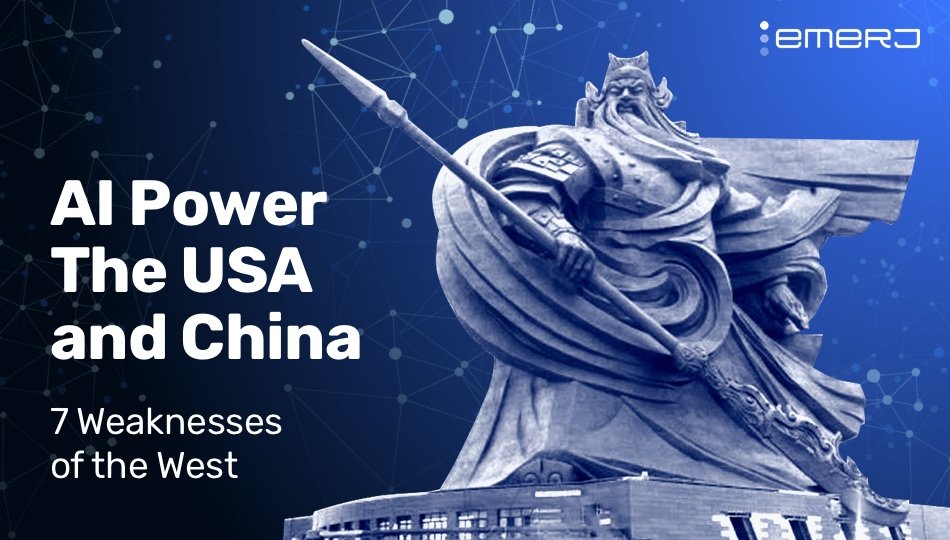The great power nations that master the use of artificial intelligence are likely to gain a tremendous military and economic benefits from the technology.
The United States benefitted greatly from a relatively fast adoption of the internet, and many of its most powerful companies today are the global giants of the internet age.
When it comes to its technological and economic future, the US generally believes:
- The USA’s prosperity and relative technological and economic prominence is guaranteed no matter what
- The most powerful nations in the world will democracies, where free speech and elected officials will (albeit not perfectly) enact the will of the people
- Bumbling forward with the same model for academic and private-sector innovation will still be able to keep the USA ahead of competitors in technological development
I believe these to be fatal assumptions.
The decade ahead will make it clear that the United States must, as it has in the past, earn its prosperity and its technological leadership – something that many Americans now take completely for granted. This will involve a focus on the competitiveness of the US economy – and a willingness to continually earn its place in the international order.
It is already patently clear that the Western model of governance, the legacy of Pericles and John Locke and Washington, is by no means the only method to a prosperous nation, or to a competitive international economy. China has already proven this, yet many in the West assume that it’s only a matter of time before China becomes a modern democracy.
Given the stakes at hand (which I hope to address by the end of this essay), the West should consider its global position as far from secure. More challenging still, the West may need to understand that many of its dear and true values may hold it back from being relevant in an inevitably AI-enabled future.
The AI Race – Seven Weaknesses of the West
I’ll briefly run through the potential competitive advantages of China’s mode of political and technological governance. The points listed below are probably assumed to be strengths by most Americans, but they may, in fact, be massive weaknesses in global competition with China’s top-down methods:
1 – Separation of state and academia
- USA
- No real control of academic life from central government, other than through the lumbering process of funding
- China
- Have students swear their allegiance to the leader (Stalin / Mao-style)
- Infiltrate universities around the world to support pro-China sentiment
- Open university centers to support the indoctrination of students into Party propaganda and allegiance to great leader
- Imprison academics who don’t support the Party
- Turn universities into “strongholds of the party’s leadership”, make orthodox Marxism dominate the minds of its scholars and students
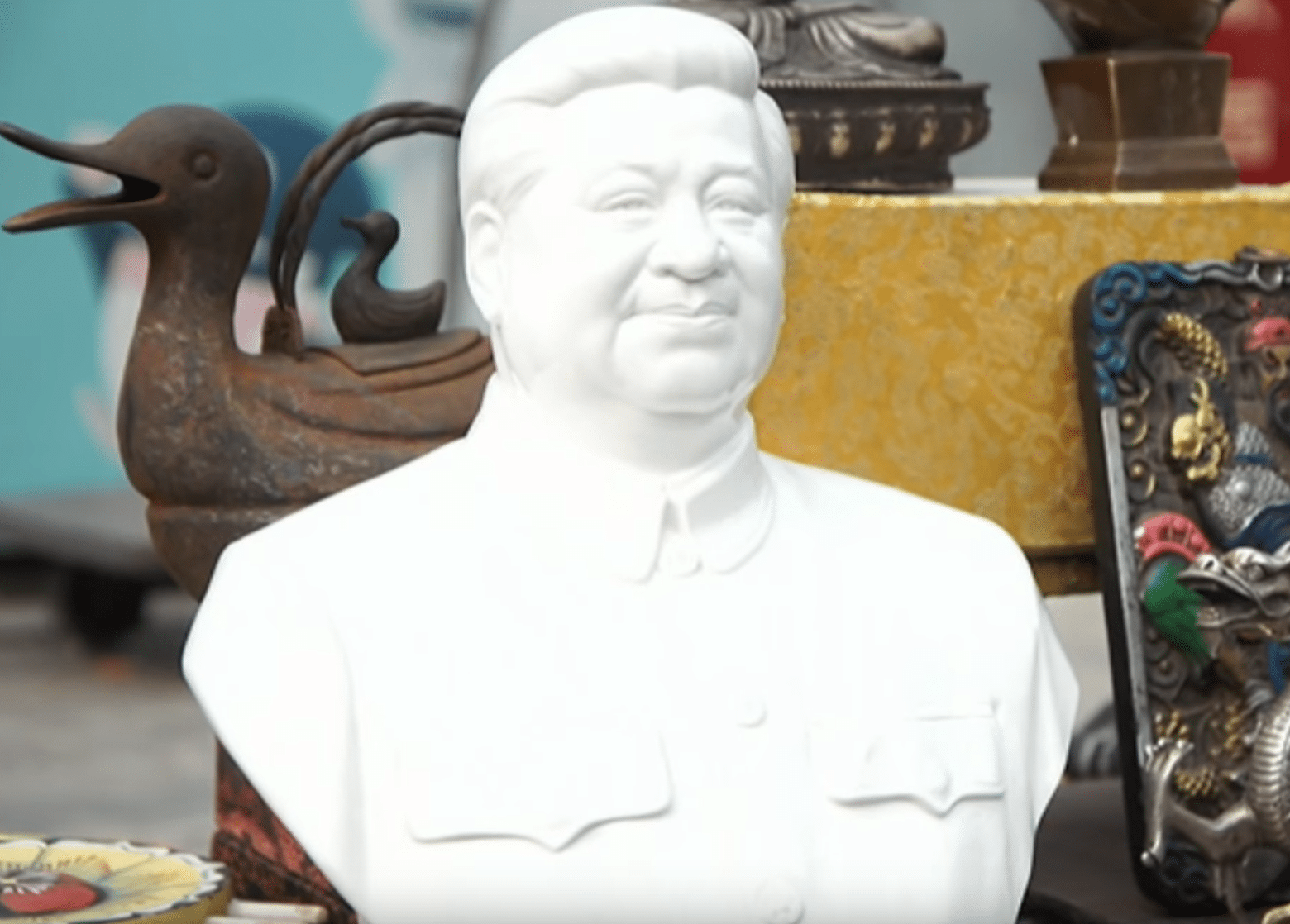
- Chinese Advantage
- China’s ruling party can directly mold the minds of its youth to suit its national aims
2 – Separation of state and private sector
- USA
- Regulate certain industries (banking, healthcare), but largely allow the private sector to act on its own
- China
- Require enterprises to serve as arms of the ruling political party’s intelligence and espionage efforts
- Chinese Advantage
- Unlike the USA, China’s ruling party can more overtly leverage private firms to serve as tools of espionage and intelligence collection for the ruling party
- China has a much more robust control of what companies (and what information) can reach its people, yet it can do business with countries that have far less sophisticated defense tech membranes
3 – AI ethics focus on privacy and individual rights
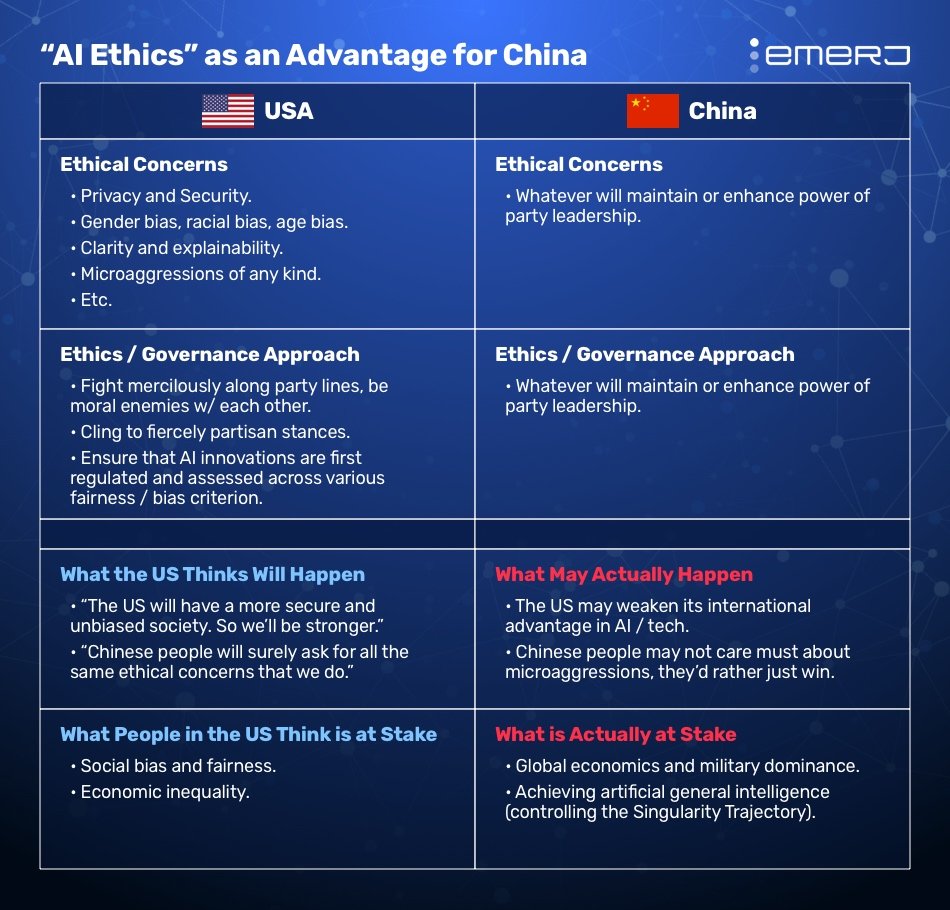
The United States wholly ignores this disadvantage, AI ethics in the West is mostly a grassroots effort, with no eye to national interests – or international balances of power.
China’s top-down approach will have a significant advantage in molding ethical norms or (in the future) tangible regulation in order to advantage the ruling party.
AI ethics in the West:
Many disparate groups and orgs.
Social justice and individual rights as main goal.#AI ethics in #China:
One united party position.
Tech and economic dominance as the main goal.The West will virtue its way into obscurity if it isn’t careful. https://t.co/9uYt41MExV
— Daniel Faggella (@danfaggella) April 30, 2019
- USA
- AI ethics initiatives mostly by individual groups and organizations not affiliated in any way with US government association (Future of Life Institute, IEEE, IEET, etc)
- Goals: Individual rights, privacy, security, preventing overwhelming power and profit by big tech firms
- China
- AI ethics efforts led by purely by national Party leadership
- Goals: Improve national prominence, secure a regulatory environment where Chinese economic and military prominence can be achieved
- Chinese Advantage
- If the Chinese government can lock up academics for not thoroughly agreeing with the ruling party’s stances, then they can certainly crush any “AI ethics” ideas that don’t align with the party’s goals. America will enter the AI ethics conversation by way of a dozen small organizations with their own ideas of AI ethics, representing their own niche interest groups or niche ethical interests. China will enter the conversation as a country, molding its policy influence specifically for the benefit of the ruling party’s goals.
- Chinese companies feel (whether through pressure to conform, or genuine sentiment) a need to make ethics be in line with China’s values specifically. Chinese billionaires have called for bringing “Chinese wisdom to international AI ethics research” (a quote from one of Baidu’s co-founders). Imagine Google’s Larry Page asking to bring “Western wisdom to international AI ethics research.” There is no emphasis in the USA’s AI ethics approach to secure the benefit of the USA. In fact, in Silicon Valley, it is far more fashionable to be ubiquitously against US interests than for them, as US interests are often conflated to imply racism or nationalism (see point 7 below: “Inner criticism, outer praise”).
In his report, Deciphering China’s AI Dream, Oxford’s Jeffrey Ding states:
“At the Asilomar Conference on Beneficial AI 2017, out of more than 150 attendees, only one was working at a Chinese institution at the time (Andrew Ng, who has now left his role at Baidu). Additionally, of the 37 researchers and 45 scientific publications funded by the Future of Life Institute’s AI Safety Research program, none of the research was conducted at a Chinese institution.
Lastly, of the 3462 AI/robotics researchers who signed a Future of Life Institute open letter to ban autonomous weapons, only three were based at Chinese institutions (all were affiliated with the Chinese University of Hong Kong). Overall, China seems to have a low level of engagement with Western countries and institutions on discussions of AI safety across private, public, and academic sectors.”
China does apparently have some opaque goals around developing ethical standards by 2025. This might simply indicate that China doesn’t trust international discourse on this topic – possibly because it is dominated by Western values around individual rights and freedoms, which are not conducive to Chinese Communist Party methods of governance.
Is the West squabble amongst themselves in matters related to AI ethics, and potential hobbles its innovations, China will likely organize a united set of policies geared not around the values of individual Chinese citizens with concern for different ethical or rights-related issues, but around a narrative that is most likely to secure Chinese predominance in economic, technological, and military terms.
Weaker nations such as the United Kingdom will place an emphasis on economic
4 – Freedom of speech, freedom of information
- USA
- Access whatever information you want, by whatever means, so long as it isn’t against the law (illegal activities include: Hate crimes, distributing child pornography, etc)
- Say whatever you want about whoever you want, even about the President of the USA, or about any topic, and so long as you aren’t inciting violence it’s alright
- China
- Imprison or torture those who stand against the ruling party’s positions on human rights, or the ruling party’s political stances, from lawyers to booksellers and beyond
- Create “re-education” camps to quash ethnic and religious minorities, and allow no one to question them within the country (and no one from outside the country gain access to what’s happening within them)
- Use AI and data to score citizens based on loyalty or risk to the state, limit their freedoms (ability to get a job, get loans, or leave the country) if they have a low score
- Chinese Advantage
- China can mold the minds of its citizenry with only the information it wants them to know, marshaling their beliefs and efforts in the direction of the ruling party
- China is able to unify its national efforts by eliminating ethnic minorities without scrutiny, and without interference from its citizens
5 – Technology openness
- USA
- Companies pride themselves in openly sharing their AI innovations (with massive open-source AI efforts from Facebook, Google, Amazon, and others), seeing this as a kind of general good
- Allow a third of a million Chinese students to study in America each year (over 80% of whom will return to China)
- China
- Steal the most valuable intellectual property from the US, ramp up espionage efforts into US tech leaders
- Ensure that foreign companies who do business in China also give up their intellectual property in order to access the Chinese market, use an “array of levers” to extract IP
- Leverage student populations to gather intelligence, and connect Chinese student organizations to the Chinese consulate to further party aims (more on this topic from ForeignPolicy.com)
- Chinese Advantage
- American companies continue to view openness as a virtuous act, while China can be more selective about what the outside world gets access to – while also gaining IP access via hacking and espionage – the best of both worlds.
- Nearly all AI innovations in English are translated to Chinese, and many AI researchers in China speak English. The opposite is not the case – so China has a much better view into all Western AI innovations than the West ever has on China’s.
- While there are certainly US efforts to pry into the ongoings of China’s government and tech firms, Chinese economic espionage is unquestionably greater than that of America – and there is little that America can do about it.
China’s growing wealth, urbanization, and massive university ecosystem have allowed it to overtake the US in scientific publications, according to the NSF. In addition, while almost all of the cutting-edge AI research in English is translated to Chinese (or can be understood by Chinese engineers who speak English), the opposite is very much not the case – making research access lopsided.
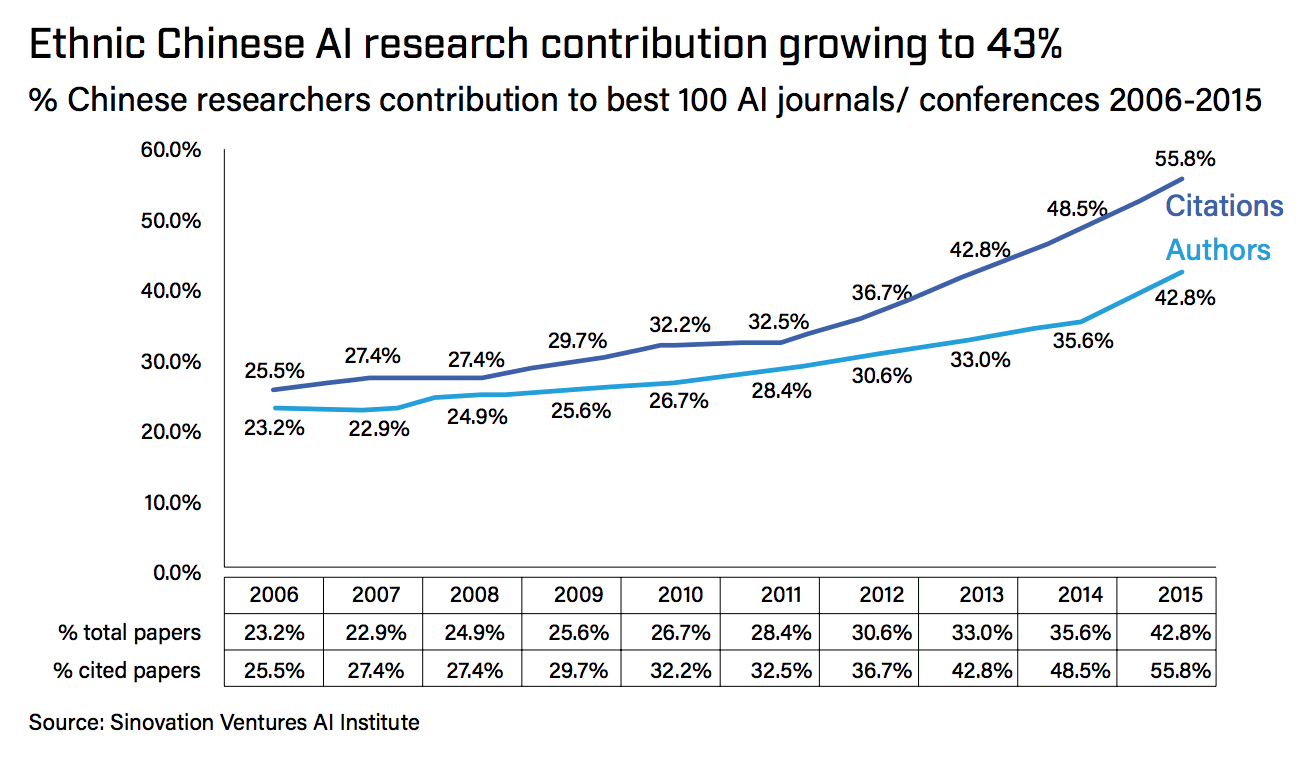
This trend runs deeper still. In an interview with the Council on Foreign Relations, Sinovations SEO Kai-Fu Lee stated that “A Chinese entrepreneur is learning from the US and China simultaneously, the US only looks to Silicon Valley… how are you going to compete in the world if you only learn half the lessons?”
The DIUx’s report China’s Technology Transfer Strategy outlines myriad means by which the US makes itself open to technology transfer risk – including Chinese-based technology transfer organizations, and U.S.-based associations sponsored by the Chinese government to recruit talent. DIUx Managing Director Mike Brown elaborates on a number of these important points during an interview at Stanford in 2017:
6 – Voting, presidential terms
- USA
- State and national government leaders are elected by the public
- Presidents can be impeached, and can serve no more than two four-year terms
- One President’s actions can be contradicted directly by the next President
- Near-term concerns dominate national politics and Presidential initiatives
- Potential demagogues are always only a maximum of four years from being elected into office
- China
- Local People’s Congresses are directly elected, and highest level officiates are elected by the Congresses immediately below them
- Officials are able to be rulers for life (from the First Emperor to the still-revered Mao)
- Leaders can focus on long-term national initiatives, rather than on getting elected in a few years (such as their national AI plan)
- Potential rivals can be purged by leading officials in order to cement power
- Chinese Advantage
- Chinese leaders, once secure of a position of leadership for life, and focus on long-term strategy and winning in the international sphere, as opposed to winning short-term votes and focusing mostly on defeating political rivals on one’s own soil (as is undoubtedly the case in America)
- Unquestioned political dominance means that the citizenry can be molded to match the will the leader or leading party in the long term, from carefully crafting their educational programs, to determining what information they can or cannot access.
7 – Inner criticism, outer praise
- USA
- See virtue in praising all other cultures above the USA, even to the extent of condoning the violation of the values they hold dear
- Being ashamed of or exclusively criticizing their own culture, believing that seeing merit in their own culture is akin to promoting racism or nationalism
- Believe that their truest enemies are their own US-based political opponents, and that the rest of the world is either (a) not a credible threat, or (b) is well-intended and friendly
- China
- Robust criticism of the Chinese government or culture could result in a prison sentence
- Warn against the dangers of vicious and immoral Western values, and indoctrinate students accordingly
- Overty encourage Chinese nationalism or superiority, from the mouth of the ruler himself
- Chinese Advantage
- In America, it is fashionable for people working in high tech to criticize and poverty display disliking of America. It is not merely that criticism is encouraged (it should be), but that respect or pride in all forms is discouraged. Criticism of any other nation is seen to be unacceptable racism, and any reverence for American values or achievements is again interpreted somehow as racism. Criticism only is permitted in the polished circles of techies on the coasts (more-so in Silicon Valley).
- China plays things the other way around, and builds a personality cult around its leader, ensuring that media and academia combine to mold the people to understand the virtues of China, and the wrong-ness of Western values – statements backed by the threat of force.
The United States is not to be seen as the “good guy” here – as being either blameless or entirely virtuous. I argue about the detriments of some of the USA’s own policies, and of some of its norms and values. The United States is far from flawless in human rights violations or international interference. I’m neither disparaging or praising the US or China here.
Nor am I saying that the US should not hold elections, or that they should pack millions of their religious and ethnic minorities into internment camps.
The issue I’m getting at is this:
Many of the values that the West holds as good, it also assumes will make it strong in the face of international competition – and that this is a terrible assumption.
The mounting power and unity of China’s AI efforts must be seen as a reason for the West to find new ways to compete in terms of influence on technology, economy, and global values – and to deal with its comparative weaknesses.
“Beating” China is not a worthy goal – there is no need for malice. Rather, the West should be concerned with not getting bowled over by the marshaled force and relative unity brought on by China’s not-so-liberal order.
The West needs a new strategy to both maintain it’s own values, and compete on the international stage. The default is not good enough if the West wants to ensure its values and prosperity continue.
I am also not demonizing China – or even it’s ruling party – for acting in it’s own self-interest. While I tend to disagree with Trump in general, I appreciated his sentiment of frankness (who knows how literally frank a politician can be, but it was at least the sentiment) when he said that he didn’t blame China for taking advantage of what he saw as unfair trade deals, because it was acting in their own self-interest. The same might be said of their citizen surveillance, or the jailing of journalists.
Trump alleged that he put the blame on US politicians who signed the agreements in the first place. Chinese and American governments can be expected to pursue what is in their self-interest, even in the face of supposed agreements to the contrary.
In the words of Bonaparte:
“Governments keep their promises only when they are forced, or when it is to their advantage to do so.”
The goal isn’t only to blame those who act against others and in their own self-interest (though sometimes this is warranted), the goal is to balance the rules and incentives to make peace and prosperity more likely than conflict and subterfuge. Doing this at an international level in coping with the trajectory of intelligence – that is the challenge.
The Mounting Advantage of China
China’s greatest advantages in the AI race can probably be boiled down to the following:
- Direction. The nation’s leader-for-life is able to marshall a succinct national effort towards economic predominance and AI innovation, an effort not to be impinged by other political parties or by rivals to the (semi-metaphorical) throne of China.
- Molding the Minds of the Citizenry. The ruling party can control the opinions of its people by determining what information they can access, by determining a single political affiliation, by molding school curriculums, and by molding a narrative in the mind of citizens that will empower the grand aims of the ruling party.
- Extensions of the Party’s Will. The ruling party can marshall the education system and universities – as well as all private sector organizations – as extensions of its own will – allowing for a lumbering but reasonably singular focus on international predominance (as opposed to the incessant, pernicious in-fighting that the West likes to occupy itself with).
On top of this, the leadership in China has been handed the single greatest asset to political power: A pliable and obedient people. Confucian ideals and traditional hierarchy (son to father, wife to husband, citizen to emperor) are the bedrock of much of China’s cultural heritage, much more than Christ or Socrates are to most Westerners.
The Analects of Confucius are rife with quotes about obedient virtue:
“The relation between superiors and inferiors is like that between the wind and the grass. The grass must bend, when the wind blows across it.”
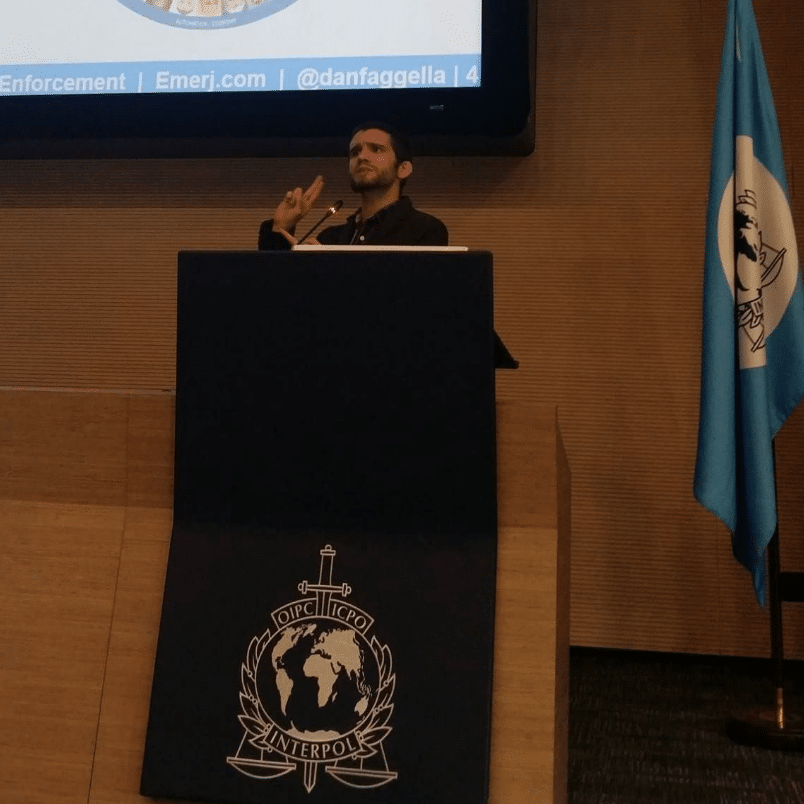
A year ago I presented this quote in my presentation about law enforcement and surveillance at INTERPOL’s Singapore HQ. Chinese representatives were in attendance, and fortunately they didn’t interpret my Confucian reference as malicious, but as indicative of a culture of hierarchy and obedience – something completely not understood by most Westerners. I have no strong opinion on whether Confucian ideas are “better” or “worse” than those of Aristotle, or Aquinas, or the Buddha, or anyone else. In his time, Confucius was lamenting the biggest issue of his day – which he believed not to be tyranny, but to be a fracture of power into many warring factions. His reverence to a single ruler was, in its context, totally understandable and probably of noble intent.
What I do believe, is that Confucian values are a tremendously powerful form of leverage in the hands of China’s leaders, and these values almost undoubtedly enable all three of the core advantages that China holds in the AI race, and in the future of the global economy.
The West ignores these competitive advantages, in both governance and culture, and presumes that all people seek the liberties that Westerners enjoy, and that nations of the USA’s particular democratic flavor are those which are destined to succeed in prosperity and in cultural influence. This is a childish assumption – and encourages a kind of lethargy that Western nations should snap out of.
(There are other advantages, such as a sense of momentum, progress and being the “good guys” – inner forces of strength that America hasn’t allowed itself to experience since the 1960’s. Writing about all of these factors would require a far longer essay.)
Why it Matters
I have written this article for two reasons:
1 – The West Needs to Wake Up
First, I believe the United States needs to assess its strategy for maintaining technological prominence and a strong economy on a global scale. The whole of the West rests on its laurels far too much. In the United States, baby boomers have lived in relatively continuous prosperity (on global terms), with a continuous position as technological, economic, and cultural prominence – and their children (my generation) are often ignorant or hardship altogether.
I do not believe that the United States should adopt a Chinese mode of governance. I am not advocating for revoking the freedom of speech, freedom of information, freedom from persecution, or freedom of political association.
What I do believe is that America is lazily under the assumption that prosperity and international influence can rest solely on these principles that many of us are reasonably proud of.
Western countries need to ask:
- How should the USA respond to the kind of relative unity and focus of Chinese technological and economic efforts?
- How can the USA unify its fighting factions and maintain a focus on its technological, economic, and cultural presence internationally?
- How can the USA ensure peaceful and fruitful international trade – and even friendship and multilateral efforts – with China?
- How can the USA keep its most important values alive in the future of global commerce and international relations?
- How can the USA support government and private organizations to innovate in technology, and to grow the economy?
The West occupies itself entirely with infighting and increasing bipolarity because there are no rivals worth competing with – and thus there are no common vision worth working towards. Much of this is – I believe – petulance wrought by idleness.
The West shouldn’t conjure China as an enemy, but as a rival and equal – a reason to have a forward vision for the country, and for international relations and the international balance of power.
At best, both nations can sharpen each other in using technology to promote prosperity, in growing the opportunities and wellbeing of humanity at large… gradually forging friendships, familiarities and interdependencies that weaken xenophobic tendencies on both sides.
At worst, the West can decide that it’s technological prominence and the values it once stood for aren’t wholly not worth maintaining, and hand over the baton of the future almost entirely to a nation with greater unity, morale, and will.
“They are the sowers, their sons shall be the reapers, and their sons, in the ordinary course of things, must yield the possession of the harvest to new competitors with keener eyes and stronger frames.” – Emerson, Essays Second Series, Manners
At present, Western eyes are anything but keen, and American frames anything but strong.
2 – Grand Consequences of AI and Humanity at Stake in the Next 50 Years
Second, many believe that the coming fifty years may be the most important fifty years in humans history. Our own polls of AI PhDs and researchers suggest that “Singularity” – or emergence of post-human intelligence – may occur before 2060.
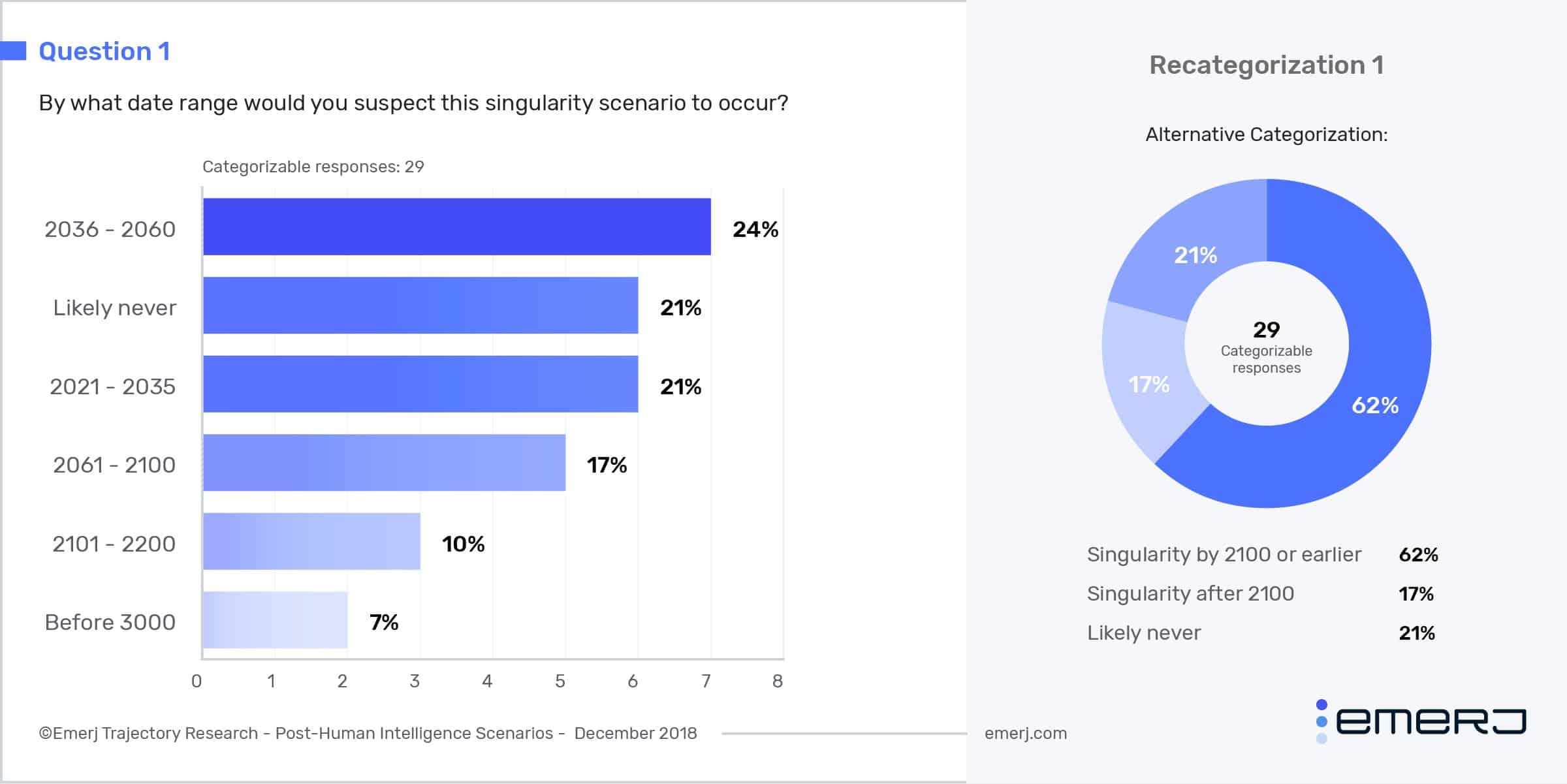
The largest AI researcher poll (from Bostrom and Müller) on superintelligence arrives at somewhat similar dates.
Some of our readers will dismiss all concerns of post-human transition as science fiction. While most of what I cover here at Emerj has to do with near-term strategy for enterprise and government leaders, the greater purpose of Emerj is to foster a conversation about where we’re ultimately headed as a species (a topic we’ll have to reserve for later articles, but which interested readers can explore here).
That doesn’t mean that you, reader, should come to Emerj primarily to learn about post-human intelligence. Many people won’t care about such things until they are much more pressing – I understand that.
Emerson’s statement about “keener eyes and stronger frames” applies to our species (cognitive enhancement and transhumanism, artificial superintelligence), and not just to nations. A transition of that kind may be unbearable in the best of circumstances.
If indeed there is a strong chance of post-human transition in the coming 50 years, then I pose a hypothesis:
The advent of neurotechnologies and artificial general intelligence will make the leading technological and economic power of the 21st century into the final human kingdom. This kingdom will largely develop, release, and (at least initially) direct the trajectory of post-human intelligence that will ultimately overtake humanity.
I’ve written about this in a longer essay called the Final Kingdom. Dealing with these dynamics will not be on the radar for most business leaders in the next two years, but these grand global power dynamics will make its way into international policy discussions and general public discourse in the coming decade.
See you next week on AI Power.
Resources
- https://admin.govexec.com/media/diux_chinatechnologytransferstudy_jan_2018_(1).pdf
- https://www.fhi.ox.ac.uk/wp-content/uploads/Deciphering_Chinas_AI-Dream.pdf
- https://www.people-press.org/2014/06/12/political-polarization-in-the-american-public/
- https://campustechnology.com/articles/2018/12/20/american-universities-are-next-battlefront-for-us-china-tech-debate.aspx
- https://www.nytimes.com/2018/10/03/business/china-economy-private-enterprise.html
- https://www.npr.org/2018/12/28/677414459/in-chinas-push-for-high-tech-hackers-target-cutting-edge-u-s-firms


